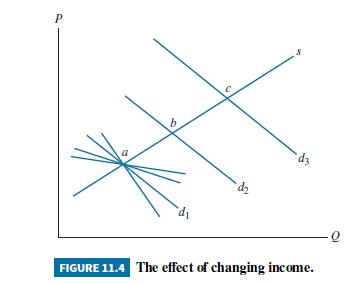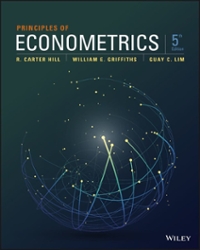Consider the supply and demand for labor, and in particular that for married women. Wages and hours
Question:
Consider the supply and demand for labor, and in particular that for married women. Wages and hours worked are jointly determined by supply and demand. Let the supply equation be

KIDSL6 are the number of children less than 6 years old, KIDS618 are the number of children who are 6 to 18 years old, NWIFEINC is household income other than the wife's earnings. Let the demand equation be

a. Imagine a supply and demand graph, like Figure 11.4, with HOURS on the vertical axis and \(\ln (W A G E)\) on the horizontal axis. Describe the anticipated effects on the graph of increases in the number of small children on the woman's supply and demand curves. What is the anticipated effect on equilibrium wage and hours worked?
b. Describe the anticipated effects on the graph of increases in experience on the woman's supply and demand curves. What is the anticipated effect on equilibrium wage and hours worked?
c. Does the necessary condition for identification appear to hold for the supply equation? What are the IVs used in 2SLS? Write out the econometric form of the reduced-form equation for \(\ln (W A G E)\), letting the coefficients be denoted as \(\pi_{1}, \pi_{2}\), etc. What hypotheses would you test to evaluate the strength of IVs used in 2SLS estimation of the supply equation?
d. Does the necessary condition for identification appear to hold for the demand equation? What are the IVs used in 2SLS? Write out the econometric form of the reduced-form equation for HOURS, letting the coefficients be denoted as \(\gamma_{1}, \gamma_{2}\), etc. What hypotheses would you test to evaluate the strength of IVs used in 2SLS estimation of the demand equation?
Data From Figure 11.4:-

Step by Step Answer:

Principles Of Econometrics
ISBN: 9781118452271
5th Edition
Authors: R Carter Hill, William E Griffiths, Guay C Lim




